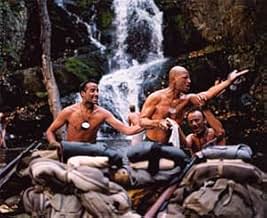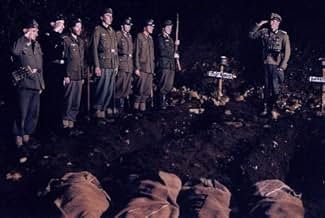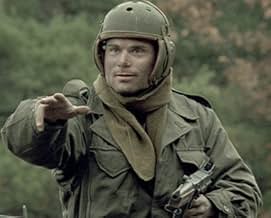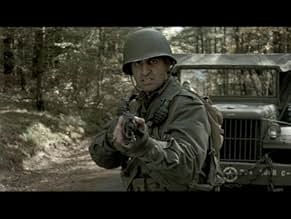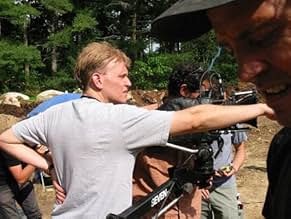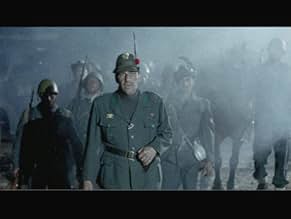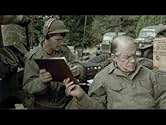IMDb RATING
5.0/10
957
YOUR RATING
The story of ordinary men during WWII as seen from three different points of View.The story of ordinary men during WWII as seen from three different points of View.The story of ordinary men during WWII as seen from three different points of View.
- Awards
- 4 wins total
Matthew Black
- Sgt. Hoakes
- (as Mathew Black)
Achim Buchner
- Franz
- (as Achim Beuchner)
- Director
- Writers
- All cast & crew
- Production, box office & more at IMDbPro
Featured reviews
As with most independent features, shot with an ultra low budget, I entered the screening of Letters from the Dead / Fallen with lower expectations than I would have of a Hollywood war movie. However I was pleasantly surprised and impressed by the film as it was unlike most conventional war movies, which tend to tell the historical aspect of the war. What this film achieves is to bring the war down to a personal level for the audience. This is done through sensational acting from the whole cast and excellent directing from Ari Taub, who chose to tell the story in both German and Italian, shying away from the commercial idea of using only English (so that American's don't have to read the subtitles). I left the cinema with a better understanding of how the war affected the individual soldier because Ari Taub has created a very refreshing and truthful film that I would recommend anybody to go and see.
Catharina Widell 17st September 2004
Catharina Widell 17st September 2004
In the autumn of 1944, in Northern Italy, the German soldiers resist to the advancement of American forces in an Italy divided in fascist soldiers, communist partisans supported by the civilians and thugs. An American platoon leaded by Sergeant Malone (John McVay) is assigned to deliver supplies to the front. Meanwhile, the German Lieutenant Gunther (Thomas Pohn) tries to keep the morale and discipline of his needy soldiers, and faces many other problems when the Italian troop leaded by the aristocratic Lieutenant Gianini (Fabio Sartor) joins his doomed troop. The thugs leaded by Rossini (Carmine Raspaolo) act like vultures, plundering the remains after the battles.
"The Fallen" is a different war movie that gives the big picture of the chaotic situation of Italy during the last days of the World War II, showing a country divided in civil war, with an unusual code of ethics between the Italian soldiers and the partisans. It is nice to have a humanistic view of the war through the three sides Italians, Germans and Americans- at the same time. The lack of discipline of the Italian soldiers breaks the tension and gives humor to this dramatic story. My vote is six.
Title (Brazil): "Guerra Sangrenta" ("Bloody War")
"The Fallen" is a different war movie that gives the big picture of the chaotic situation of Italy during the last days of the World War II, showing a country divided in civil war, with an unusual code of ethics between the Italian soldiers and the partisans. It is nice to have a humanistic view of the war through the three sides Italians, Germans and Americans- at the same time. The lack of discipline of the Italian soldiers breaks the tension and gives humor to this dramatic story. My vote is six.
Title (Brazil): "Guerra Sangrenta" ("Bloody War")
Ari Taub takes on an immense project of independently shooting a war film set during WWII. Despite the numerous industry warnings against doing period films, Ari pulls it off with an engaging film, good characters, and an impressive production design. The production design for this film is stellar. The Italian actors are fantastic creating very engaging and likable characters. I should note here that this film is in three languages (Italian, German and English) and I applaud Ari maintaining this aspect to his story instead of making everyone speak English. The story is good, faithful to the large ensemble genre of post-WWII war film dramas. If anything, this film proves that Ari Taub is a capable, resourceful and ambitious director with a bright future and ability to deliver above expectation and means. "The Fallen" is worth a view and praise for everything accomplished by the cast, crew, and producers making this independent film.
"The Fallen" at first seems like an old-fashioned World War II movie, opening with almost "Hogan's Heroes"-like humor with "Milo Minderbinder" of "Catch-22" like wheeling-dealing, but gradually develops into a moving and complex portrait of soldiers.
Most English-language films we have seen about GI's interacting with locals have been in French forests, but this is set in the more complex social, political and military environment of northern Italy at the close of the war, dealt with superficially in "Captain Corelli's Mandolin" and almost contemporaneously in Roberto Rossellini's "Paisà", which was also a series of vignettes.
The very large ensemble that gets hard to differentiate individually includes Americans closing in on the Germans who are equally allies and occupiers to Italians buffeted by deposed fascists, Communist partisans, displaced peasants and apolitical criminals, an unusually diverse array of characters who all claim to be nationalists.
Like a Bill Maudlin cartoon, this is war from the GI's eye view; we don't see generals or hear discussions of strategy or tactics, just orders to follow. The American soldiers, as drawn by the script of Nick Day and Caio Ribeiro, are the most stereotyped from old movies, the hulking hillbilly, the Italian guy from Brooklyn who is delegated to do translations and community relations as the locals eagerly ask if he knows their cousins, the alcoholic officer in charge, etc. In the second half of the film, the Americans' portrayal sharpens up as the supply guys in the quartermaster corps are thrust into the front lines for the first time and there's less dialog and more taut action.
The German soldiers are the least stereotyped, despite many close-ups on their black crosses and Heil Hitler salutes. They are shown as professional, competent soldiers doing their job far from home in a crumbling situation, with limited supplies and manpower. Though sounding more like World War I trench movies (and characters on all sides recall relatives who were inspiring veterans), their discussions of the futility of continuing to fight are plausible and add complications to their actions.
The Italians are a mix of stereotypes and complexities. The sex-starved peasant women are just plain silly, and the Army, regardless of accurate issues of unpreparedness, looks like buffoons. The Mafiosi-like thug and his henchmen are the usual, but their interactions with the armies are interesting, even if it is never explained how they've avoided the war up to now. The refugees are both as haunted and resilient as "Mother Courage".
While far less bloody than "Saving Private Ryan", it is unpredictable what will happen to characters we get to care about and is unsparing in showing the personal devastation of war. Debut feature director Ari Taub does the fight scenes very up close and personal, and very effectively portrays a real sense of actual combat, particularly for a low-budget film.
The developing serious tone is undone many times by the melodramatic score which overemphasizes comedic elements of the absurdity of war. Period songs by interesting voices are used effectively throughout.
With each nationality speaking in their native tongues, the subtitles are black-lined and always legible. The subtitles are also thoughtfully provided even when characters are speaking English but with thick accents. Language communication issues are a key part of this story.
Most English-language films we have seen about GI's interacting with locals have been in French forests, but this is set in the more complex social, political and military environment of northern Italy at the close of the war, dealt with superficially in "Captain Corelli's Mandolin" and almost contemporaneously in Roberto Rossellini's "Paisà", which was also a series of vignettes.
The very large ensemble that gets hard to differentiate individually includes Americans closing in on the Germans who are equally allies and occupiers to Italians buffeted by deposed fascists, Communist partisans, displaced peasants and apolitical criminals, an unusually diverse array of characters who all claim to be nationalists.
Like a Bill Maudlin cartoon, this is war from the GI's eye view; we don't see generals or hear discussions of strategy or tactics, just orders to follow. The American soldiers, as drawn by the script of Nick Day and Caio Ribeiro, are the most stereotyped from old movies, the hulking hillbilly, the Italian guy from Brooklyn who is delegated to do translations and community relations as the locals eagerly ask if he knows their cousins, the alcoholic officer in charge, etc. In the second half of the film, the Americans' portrayal sharpens up as the supply guys in the quartermaster corps are thrust into the front lines for the first time and there's less dialog and more taut action.
The German soldiers are the least stereotyped, despite many close-ups on their black crosses and Heil Hitler salutes. They are shown as professional, competent soldiers doing their job far from home in a crumbling situation, with limited supplies and manpower. Though sounding more like World War I trench movies (and characters on all sides recall relatives who were inspiring veterans), their discussions of the futility of continuing to fight are plausible and add complications to their actions.
The Italians are a mix of stereotypes and complexities. The sex-starved peasant women are just plain silly, and the Army, regardless of accurate issues of unpreparedness, looks like buffoons. The Mafiosi-like thug and his henchmen are the usual, but their interactions with the armies are interesting, even if it is never explained how they've avoided the war up to now. The refugees are both as haunted and resilient as "Mother Courage".
While far less bloody than "Saving Private Ryan", it is unpredictable what will happen to characters we get to care about and is unsparing in showing the personal devastation of war. Debut feature director Ari Taub does the fight scenes very up close and personal, and very effectively portrays a real sense of actual combat, particularly for a low-budget film.
The developing serious tone is undone many times by the melodramatic score which overemphasizes comedic elements of the absurdity of war. Period songs by interesting voices are used effectively throughout.
With each nationality speaking in their native tongues, the subtitles are black-lined and always legible. The subtitles are also thoughtfully provided even when characters are speaking English but with thick accents. Language communication issues are a key part of this story.
I should admit right away that I don't like war movies. So when I was invited to see this film I went, because I knew that the person who invited me has good taste and wouldn't sponsor a film that wasn't good. I was pleasantly surprised when this film totally took hold of me. The theater was crowded, and I was very hungry with no popcorn. So when I found myself totally engrossed in this black and white film that deals with the gritty life of soldiers during World War II I was amazed. I got so involved in the lives of the men in this film that I forgot all about my hunger, and like a good novel, the film sped along to its end.
This film does a really good job of examining the lives of three different groups of soldiers, giving the audience a look at divergent points of view during wartime. Added to this is the fact that technically the film is very well done. I would say this is a war movie for people who don't usually enjoy them. All in all a very well done film for a first time director. I hope to see this placed in many more theaters so more people can see it.
This film does a really good job of examining the lives of three different groups of soldiers, giving the audience a look at divergent points of view during wartime. Added to this is the fact that technically the film is very well done. I would say this is a war movie for people who don't usually enjoy them. All in all a very well done film for a first time director. I hope to see this placed in many more theaters so more people can see it.
Did you know
- ConnectionsEdited into Last Letters from Monte Rosa (2010)
Details
Box office
- Budget
- $600,000 (estimated)
- Gross worldwide
- $88,245
- Runtime
- 1h 52m(112 min)
- Color
- Aspect ratio
- 2.35 : 1
Contribute to this page
Suggest an edit or add missing content

